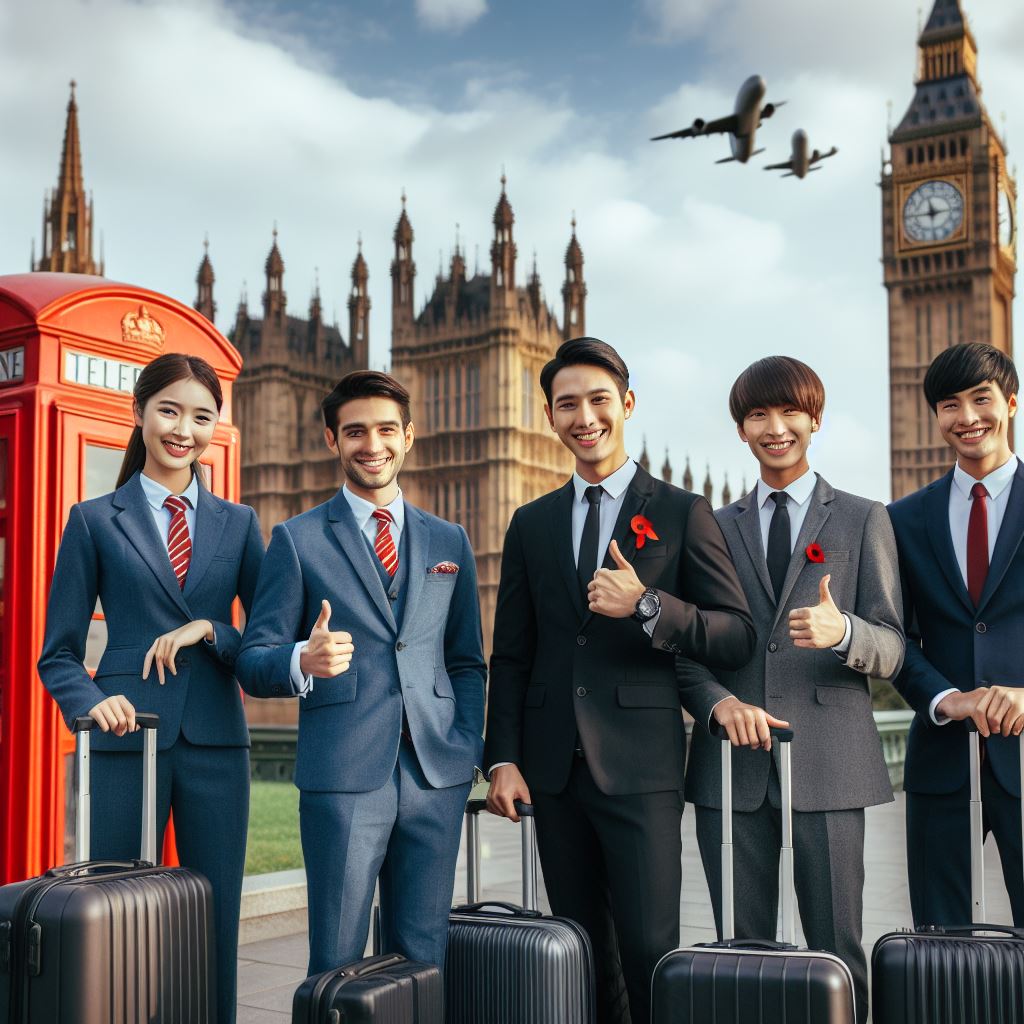Introduction
Navigating the vibrant travel industry in the UK reveals consistent growth, fostering diverse opportunities.
Travel consultants serve as indispensable advisors, ensuring travelers access informed guidance and support.
As the industry thrives, challenges emerge, demanding innovative solutions.
Consultants encounter complexities like fluctuating regulations and evolving customer expectations.
Their pivotal role involves crafting tailored itineraries, addressing unique preferences, and resolving unforeseen issues.
This blog dissects these challenges, shedding light on effective strategies for resolution.
With constant evolution, consultants must adapt, embracing technology and honing interpersonal skills.
Amidst hurdles, the dedication of travel consultants remains unwavering, ensuring seamless and memorable travel experiences.
This section delves into the dynamic landscape, exploring the hurdles faced by consultants and the proactive measures fostering excellence in their services.
Join us as we unveil the realm of overcoming challenges in travel consulting, a sphere marked by resilience and innovation.
Understanding the challenges in travel consulting
Travel consulting is a dynamic field that requires professionals to adapt to various challenges in order to provide excellent service to clients.
Understanding and effectively tackling these challenges is crucial for success in the industry.
Here are some common obstacles faced by travel consultants and strategies for overcoming them:
1. Varied Expectations and Travel Preferences of Clients
- Listen actively to clients and take note of their specific requirements and preferences.
- Offer personalized recommendations and tailored itineraries that cater to individual needs.
- Regularly communicate with clients to ensure their expectations are managed effectively throughout the process.
- Provide clear and detailed information about different travel options and their associated costs.
- Continuously update your knowledge of popular destinations and emerging travel trends to better serve clients.
2. Dealing with Time Constraints and Limited Resources
- Develop efficient time management skills to handle multiple clients and their travel plans simultaneously.
- Prioritize tasks based on urgency and importance to ensure timely completion of each assignment.
- Establish strong relationships with reliable travel suppliers to access the best deals and secure necessary bookings promptly.
- Utilize technology tools and software to streamline administrative tasks and maximize productivity.
- Delegate responsibilities whenever possible to optimize the use of available resources.
3. Adapting to Changing Travel Trends and Market Demands
- Engage in continuous professional development to enhance your knowledge and stay up to date with the latest industry trends.
- Attend travel conferences, workshops, and seminars to network with peers and gain insights into emerging market demands.
- Regularly analyze market research and consumer behavior patterns to anticipate and adapt to changing client preferences.
- Collaborate with colleagues and industry experts to share experiences, tips, and best practices for navigating market fluctuations.
- Be open to embracing new technologies and digital platforms to enhance the efficiency and effectiveness of your services.
In fact, working in travel consulting comes with its own set of challenges.
However, by understanding the varied expectations of clients, effectively managing time constraints and limited resources, and staying abreast of changing travel trends and market demands, professionals in this field can successfully overcome these obstacles.
By continuously improving their skills and adapting to evolving industry landscapes, travel consultants can provide exceptional services and create memorable travel experiences for their clients.
Read: UK Hotel Management: Skills and Duties
Improving travel consulting skills
Effective travel consulting requires a range of skills and abilities that go beyond simply booking flights and hotels.
This section will explore key areas for improvement to become a successful travel consultant.
Continuous learning and staying updated with industry knowledge
- Attend industry conferences and exhibitions to expand your knowledge and stay updated with the latest trends.
- Subscribe to industry newsletters, blogs, and magazines to receive regular updates on changes in the travel industry.
- Engage in online forums and communities to connect with other travel professionals and exchange useful information.
Enhancing communication and interpersonal skills
- Practice active listening to understand clients’ needs and preferences, enabling you to provide personalized travel recommendations.
- Improve your verbal and written communication skills to convey information clearly and professionally.
- Develop empathy and emotional intelligence to build rapport with clients and understand their travel expectations.
- Cultivate excellent customer service skills to ensure client satisfaction throughout their travel experience.
Developing problem-solving abilities to handle unforeseen situations
- Enhance your critical thinking skills to assess situations quickly and make effective decisions when faced with challenges.
- Develop a proactive mindset and anticipate potential problems before they occur to minimize disruptions for clients.
- Build a network of contacts in the travel industry, including hotels, airlines, and local guides, to help resolve issues swiftly.
- Familiarize yourself with insurance policies and travel regulations to offer appropriate guidance and support in case of emergencies.
Improving travel consulting skills is an ongoing process that requires dedication, a thirst for knowledge, and a willingness to adapt to change.
By continuously learning and staying updated with industry knowledge, enhancing communication and interpersonal skills, and developing problem-solving abilities, travel consultants can overcome challenges and provide exceptional service to their clients.
Remember, the key to success in this field lies in the ability to understand and meet the unique needs of each traveler.
Now that we have explored the essential areas for improvement in travel consulting skills, the next section will delve into the importance of building a strong client base and maintaining long-term relationships.
Read: UK Hotel Management: Skills and Duties

Effective time management in travel consulting
In the fast-paced world of travel consulting, time management is crucial for success.
With numerous tasks and responsibilities to juggle, it is essential to prioritize and set realistic goals to ensure efficiency and productivity.
By utilizing technology and delegating responsibilities, travel consultants can streamline their operations and overcome challenges effectively.
1. Prioritizing Tasks
- As a travel consultant, it is important to identify the most urgent and important tasks.
- Start by creating a to-do list and categorize tasks based on their level of importance and deadlines.
- Prioritize tasks that require immediate attention, such as finalizing bookings or assisting clients with urgent travel issues.
- By prioritizing tasks, you can ensure that crucial activities are completed first, minimizing the risk of delay or mistakes.
2. Setting Realistic Goals
- Set achievable goals based on your capacity and available resources.
- Break down larger tasks into smaller, manageable milestones to track progress effectively.
- Avoid overcommitting or setting unrealistic timelines, as this can lead to burnout and reduced quality of work.
- By setting realistic goals, you will have a clear roadmap and be able to manage your time more effectively.
3. Utilizing Technology for Efficient Travel Planning
- Embrace technology tools and software designed specifically for travel consultants.
- Use travel management systems that provide features like itinerary planning, booking management, and automated notifications.
- Explore online booking platforms and travel apps to streamline the reservation process and save time.
- By leveraging technology, you can access real-time information, communicate with clients more efficiently, and enhance overall productivity.
4. Delegating Responsibilities
- Recognize the importance of teamwork and delegate tasks among team members.
- Distribute responsibilities based on individual strengths and expertise to maximize efficiency.
- Empower team members by providing clear instructions and setting expectations.
- Delegating responsibilities allows you to focus on high-priority tasks while ensuring smooth operations.
5. Effective Communication
- Good communication is essential for efficient time management in travel consulting.
- Establish open lines of communication with clients, suppliers, and team members.
- Clearly communicate expectations, deadlines, and any changes or updates to avoid misunderstandings or delays.
- Utilize communication tools like emails, video conferencing, or project management platforms to stay connected and organized.
6. Regular Evaluation and Adapting
- Continuously assess your time management strategies and make adjustments as needed.
- Analyze your workload regularly to identify any bottlenecks or areas for improvement.
- Reflect on completed tasks and evaluate whether goals were achieved within the set timelines.
- Adapt your time management techniques based on lessons learned and changing business demands.
In short, effective time management is crucial for travel consultants to overcome challenges and excel in their profession.
By prioritizing tasks, setting realistic goals, utilizing technology, delegating responsibilities, and maintaining effective communication, travel consultants can optimize their operations.
With efficient time management, travel consultants can meet client expectations, enhance productivity, and achieve business success.
Read: A Day in the Life of a UK Hotel Manager
Building strong client relationships
Active listening and understanding clients’ needs
When it comes to overcoming challenges in travel consulting, building strong client relationships is crucial.
One of the key aspects of achieving this is through active listening.
By truly understanding clients’ needs, consultants can tailor their services to meet those requirements.
Active listening involves giving clients your full attention and comprehending their desires, preferences, and concerns.
This enables consultants to provide customized recommendations and solutions that address specific travel challenges.
It also helps establish trust and rapport with clients, which is essential for a successful partnership.
Personalizing travel itineraries and recommendations
No two clients are the same, so it’s vital to personalize travel itineraries and recommendations based on individual preferences.
This is another key factor in building strong client relationships in travel consulting.
Consultants should go beyond simply suggesting popular tourist destinations and activities.
They should take the time to understand clients’ interests, goals, and desired experiences.
By doing so, consultants can create bespoke travel plans that cater to clients’ unique needs, making their trips truly memorable.
Personalized UK Career Consulting
Receive tailored career guidance designed just for you. Get actionable steps and expert support to boost your career in 1-3 days. Take control of your career now.
Get StartedMoreover, personalization allows consultants to add a touch of exclusivity, ensuring their clients feel valued and appreciated.
This further strengthens the bond between the consultant and the client, fostering a long-term relationship.
Providing excellent customer service and timely follow-ups
Customer service plays a pivotal role in any industry, and travel consulting is no exception.
By providing excellent customer service, consultants can overcome many challenges and strengthen their client relationships.
Travel consultants should strive to exceed clients’ expectations by being responsive, helpful, and attentive.
Promptly addressing any concerns or issues that arise during the trip planning process demonstrates a commitment to excellent service and client satisfaction.
In addition to providing excellent customer service, timely follow-ups are essential for building strong client relationships.
Whether it’s confirming itinerary details, addressing any post-trip queries, or simply checking in to see how the client’s trip went, following up shows that the consultant genuinely cares about the client’s experience.
By maintaining open lines of communication, travel consultants can build trust and loyalty, leading to repeat business and positive referrals.
In summary, building strong client relationships is essential in overcoming challenges in travel consulting.
Active listening, personalization, excellent customer service, and timely follow-ups are all crucial factors in achieving this goal.
By implementing these strategies, travel consultants can establish lasting partnerships with their clients and navigate any challenges that arise along the way.
Read: Cultural Differences: Waitstaff in the UK vs Abroad
Addressing unforeseen challenges
Handling travel disruptions and cancellations
- Prepare a list of alternative flights and accommodations to quickly address cancellations.
- Stay updated with weather forecasts and travel advisories to anticipate potential disruptions.
- Maintain open communication channels with airlines and hotels to receive prompt updates on any changes.
- Foster good relationships with travel suppliers to negotiate better alternatives or refunds for clients.
- Train staff in handling customer complaints and providing efficient solutions to minimize inconvenience.
Managing difficult clients and resolving conflicts
- Listen actively to understand clients’ concerns and frustrations before offering solutions.
- Maintain a calm and empathetic approach to defuse tense situations and build rapport.
- Offer alternative options that align with clients’ preferences to ensure their satisfaction.
- Document all interactions with difficult clients and report any abusive behavior to supervisors.
- Seek guidance from experienced colleagues or superiors to handle particularly challenging cases.
Implementing backup plans and alternative arrangements
- Develop a comprehensive contingency plan for different types of travel disruptions or unforeseen circumstances.
- Communicate backup options to clients during the initial booking process to manage expectations.
- Collaborate with industry partners to secure alternative accommodations, transportation, or activities.
- Provide clients with clear instructions and updates on how alternative arrangements will be implemented.
- Conduct post-travel evaluations to identify areas for improvement in backup plans and alternative arrangements.
In summary, addressing unforeseen challenges in travel consulting requires proactive measures, effective communication, and strategic planning.
By handling travel disruptions and cancellations promptly, managing difficult clients with empathy, and implementing backup plans, travel consultants can ensure a smooth travel experience for their clients.
Learn More: Understanding UK Travel Trends in 2024
Conclusion
Working in travel consulting can be both challenging and rewarding.
Overcoming these challenges is crucial for professional growth and ensuring client satisfaction.
It is important to remember that every challenge presents an opportunity to excel and learn.
Aspiring travel consultants should embrace these challenges and strive to provide exceptional service, gaining expertise and building a successful career in the industry.
With determination, perseverance, and a passion for travel, anyone can overcome the obstacles in this field and achieve success.
So, don’t be afraid to take risks, embrace challenges, and excel in your travel consulting career. The possibilities are endless!
[E-Book for Sale]
500 Cutting-Edge Tech Startup Ideas for 2024 & 2025: Innovate, Create, Dominate
$19.99 • 500 Tech Startup Ideas • 62 pages
You will get inspired with 500 innovative tech startup ideas for 2024 and 2025, complete with concise descriptions to help you kickstart your entrepreneurial journey in AI, Blockchain, IoT, Fintech, and AR/VR.




